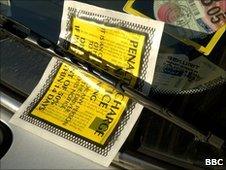'Best and worst' English NHS hospital car parks named
- Published

There are calls for government to scrap the charges
A revamp of hospital car parking is needed, consumer watchdog Which? says after looking into the best and worst practices in England.
The group found a wide variation in the frequency with which patients were clamped and fined for breaching rules.
Using data from 126 Freedom Of Information requests, Epsom and St Helier University Hospitals NHS Trust came top for clamping.
Over a year the hospital clamped 1,671 cars and made nearly £2m profit.
Leeds General Infirmary issued the most parking tickets - over 10,000, generating £142,000 profit.
The Royal Derby was the target of the most criticism - it received 82 complaints in 2008-09.
According to Which?, 70% of people have experienced problems with an NHS hospital car park and for nearly half, parking made what can be a very stressful time even worse.
It is calling on NHS hospitals to improve car parking services by banning clamping and towing. It also wants "fairer" charging systems such as allowing patients to pay on departure rather than arrival, or reimbursing patients for additional parking fees when appointments are delayed.
In September last year, former health secretary Andy Burnham announced that hospital car parking charges for in-patients, their families and friends would be scrapped within three years in England.
The coalition Government has no current plans to carry this out.
A spokeswoman for the Department of Health said the issue was still being looked at.
She said: "We can't be in favour of decentralisation and greater autonomy for NHS and then tell them how to run their car parking.
"But it's clear that, where parking charges are making it difficult for staff to do their jobs properly, where they are damaging patients access to services, or where they are stopping friends and relatives from visiting - they are too high, and hospital trusts have a responsibility to look at those factors."
Best and worst
To rank the hospitals Which? judged them against criteria based on capacity, convenience of payment methods, frequency and type of penalties, charging structure and profits, and communication with patients.
The hospital deemed the best was the Royal United Hospital Bath, followed by the North Devon District Hospital and the Royal Preston Hospital.
Which? praised the Royal United Hospital for providing a large number of priority spaces, in particularly for blue badge holders and dialysis patients, and a variety of payment methods - pay & display, barrier mechanism and payment on departure.
Visitors also get free parking for the first 20 minutes, and charges are capped for patients receiving ongoing continuous treatment and for visitors of long-term patients.
Furthermore, the hospital has not made any profit from parking charges or penalties.
Which? chief executive Peter Vicary-Smith said: "Royal United Hospital Bath shows that not every hospital visit needs to end in a parking nightmare. Now we know which hospitals are scoring badly, they must take action and improve their parking services.
"Visiting hospital is stressful enough without having to worry about being clamped or getting a ticket. Surely this is now the end of the road for the worst hospital car parks?"
Julie Acred, chief executive of the Derby Hospitals NHS Foundation Trust, said the complaints about their car parks coincided with the construction and opening of the new Royal Derby Hospital during 2009.
"Some were about barriers not working properly, others were about where pay machines were sited and other visitors couldn't find our disabled parking spaces. These were all things we came across in the early months. Now things are moving much more smoothly."
The Epsom and St Helier University Hospitals NHS Trust said the majority of the cars clamped belonged to staff.
And it said in a statement that any profit made was spent on the running of the car park or within its hospitals on patient care.
Leeds Teaching Hospitals NHS Trust said it rejected any suggestion that having a high number of penalty charge notices issued implied the car parks were badly managed.
A spokesman said: "We also already meet the majority of the 10 'demands' Which? has identified in its survey and will be writing to the publication to make this clear."
He said hospitals in city centres, such as Leeds General Infirmary, relied on penalties to deter non-hospital users from parking.
Professor Stephen Glaister, director of the RAC Foundation, said: "If a trust must charge for parking and needs to differentiate between patients, visitors and staff, then there are many ways to do this.
"It is quite possible for bona fide patients and visitors to park free whilst other car users pay a reasonable amount."
Laura Keely, of Macmillan Cancer Support, called for free hospital car parking for all cancer patients.
"As a first step we urge the Department of Health to publish its response to the NHS car parking consultation."